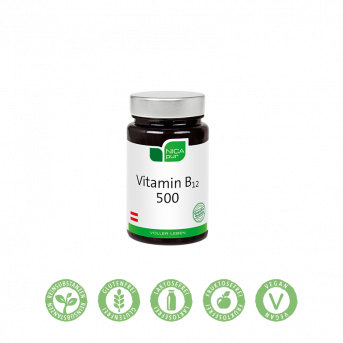






Vitamin B12 500 für Energie, Nerven und Blut - 60 Kapseln
Vitamin B12 (cobalamin) is a water-soluble vitamin from the B group that is mainly found in animal foods. Since we cannot form it independently, we are dependent on an adequate supply from outside. It is absorbed into the human body with the help of a special protein via the small intestine and transported from there into the blood. Vitamin B12 can be stored in the liver for a longer period of time. Therefore, a lack of supply only becomes noticeable after some time. Likewise, the limited absorption capacity of the intestine with increasing age can lead to an increased need.
Vitamin B12 is important for the production of red blood cells, the function of nerve cells and the psyche, as well as for numerous metabolic processes in the body, such as energy, fat and carbohydrate metabolism. It reduces fatigue and supports the functions of the immune system. Together with the B vitamins folic acid and vitamin B6, this trio contributes to normal homocysteine metabolism.
Three micrograms a day: the German Society for Nutrition recommends this much vitamin B12 for a healthy adult. But there are also groups of people who have an increased need. These include vegetarians and vegans, people who are active in sports (important for muscle building) and people who are exposed to increased stress.
A deficiency can show the following symptoms:
The daily requirement also depends on age and body weight.
0 to 4 months: 0.4 μg/day
4 to less than 12 months: 0.8 μg/day
1 to under 4 years: 1.0 μg/day
4 to under 7 years: 1.5 μg/day
7 to under 10 years: 1.8 μg/day
10 to under 13 years: 2.0 μg/day
13 to under 15 years: 3.0 μg/day
Adolescents from 15 years and adults: 3.0 μg/day
Pregnant women: 3.5 μg/day
Breastfeeding women: 4.0 mcg/day
According to the current state of science, an overdose of vitamin B12 is practically impossible due to the automatic excretion. Unless you inject it in a highly concentrated form with a syringe. But even then, in the worst case, acne-like symptoms or mild allergic reactions can occur. In this case, it is best to speak to your family doctor.
1. Beef liver (65 micrograms in 100 grams)
2. Oyster (15 in 100 grams)
3. Mackerel (9 in 100 grams)
4. Herring (8.5 micrograms in 40 grams)
5. Lean beef (5 in 150 grams) 6. Trout (4.5 in 150 grams)
7. Salmon (4.4 in 150 grams)
8. Tuna (4.25 in 100 grams)
9. Sea Bass (3.7 in 100 grams)
10. Emmental and Camembert (3.1 micrograms in 100 grams)
Vitamin B12 for vegetarian and vegan diets
This list shows that a vegetarian or vegan diet makes it difficult to get vitamin B12. Therefore, vegetarians and vegans are particularly dependent on an adequate supply. This is where dietary supplements can be very helpful. Fermented foods such as sauerkraut also contain vitamin B12 – but only in small amounts. Certain microorganisms are at work here, metabolizing the valuable vitamin.
Consume 1 capsule daily with plenty of liquid.
Filler: cellulose powder, hydroxypropylmethylcellulose (capsule shell), methylcobalamin, hydroxycobalamin, 5-deoxyadenosylcobalamin.